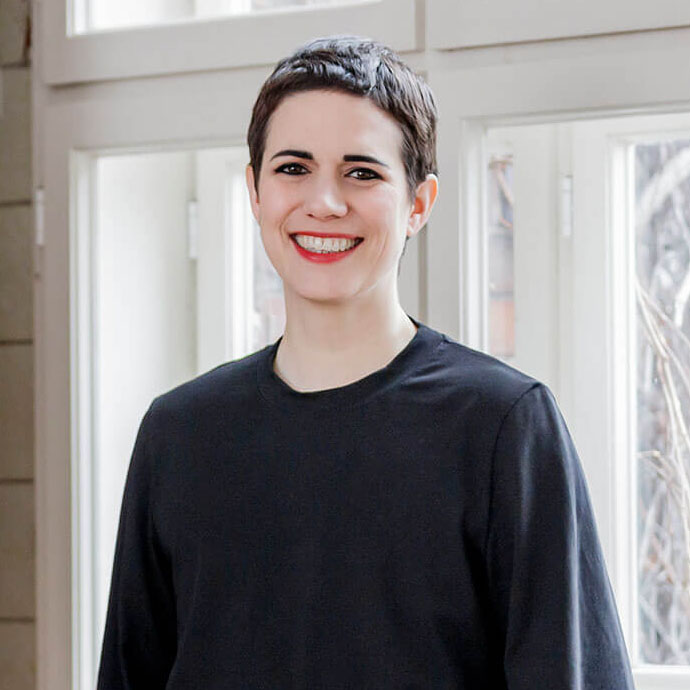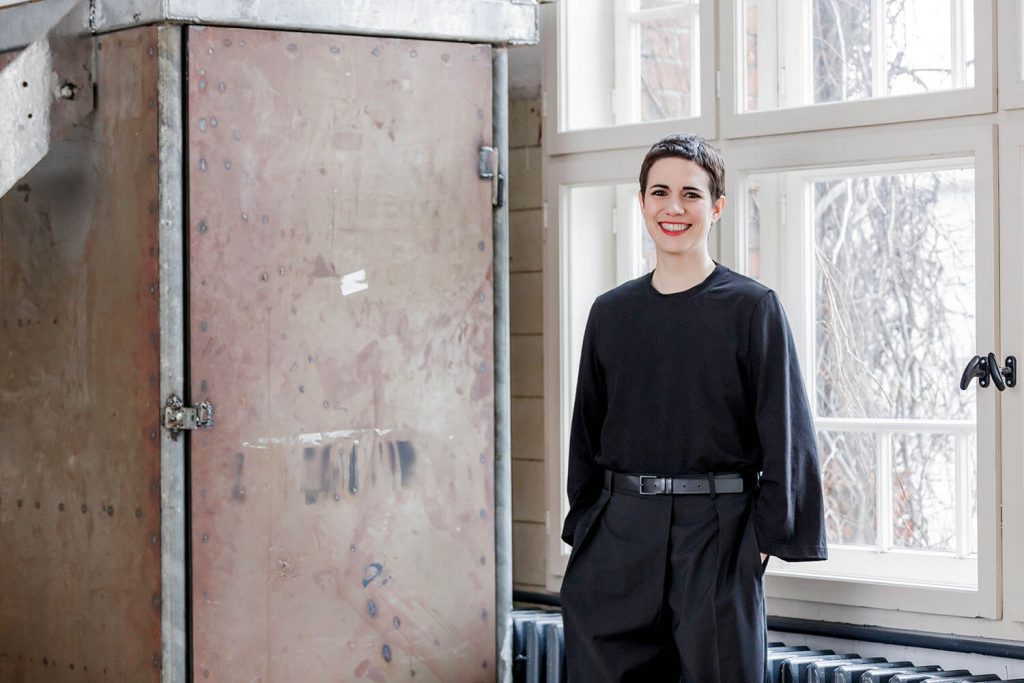Rebecka Heinz (she/her)
There is untapped potential in the new life experience of former cancer patients.

I am a manager, strategy consultant, mom, ex-breast cancer patient, affected person expert and founder of the platform #einevonacht.
Professionally, I work as an interim manager, filling in for corporate communications departments when bottlenecks arise due to illness or staff changes. I also support young women in leadership positions as a sparring partner when they are the only woman sitting at the conference table in their companies among the men. I myself worked for many years as an executive in the music industry and managed the German Music Awards for the German Music Industry Association. I know what it means to be the only woman in the room.
In 2019 I started my own business, in 2020 my daughter was born and a year and a half later, at the end of 2021, I was diagnosed with breast cancer. Experiencing the kind of rut, you get into after such a diagnosis, I started the #einevonacht project in early 2022 during my chemotherapy and began conducting background interviews with former breast cancer patients. In the meantime, I have a small team at the start and together we develop offers that support women in dealing with the diagnosis of breast cancer.
In terms of how we deal with cancer? Most definitely: Take away all prejudices. Beginner’s mind. That would make life easier. Then everyone would stay much more in the current situation, with their current counterpart, and not bring their whole own canon of fears and anxieties into the situation.
The #einevonacht project has developed very quickly and more and more offers are being added. Our goal: to make it as easy as possible for breast cancer patients to deal with this incredibly corrosive diagnosis.
One in eight women will get breast cancer at some point in her life. That’s 70,000 women a year in Germany alone. Just under half of them are under 55.
The original goal of #einevonacht was to gather the knowledge and stories of other ex-breast cancer patients and build a positive-empowering meta-page where the „new“ breast cancer patients can get inspired. A page they can browse for tips that are personal to them.
But then the more conversations I had with affected women, the more I understood that the problem is much bigger than I thought. There is a lack of many things. There is a lack of offers beyond medical therapy, for clarifying strategic questions regarding positioning in the professional context, for mental strengthening. There is a lack of help in re-entering the working world. There is a lack of protective spaces where needs, wishes and expectations can be discussed openly. From the point of view of those affected and from the point of view of the employer.
This is where we come in. And we do so according to the integral approach. We work not only with those affected, but also with the organizational environment. We bridge the gap between personal illness and the corporate context. We look at the entire system.
Diversity management is about strengthening diversity in companies. It’s about including different personalities with different backgrounds, experiences and perspectives in the processes.
And nothing changes the way you look at life, at work, like a potentially life-threatening illness. During this time, horizons are shifted immeasurably, broadened – people bring new perspectives to the workplace, but also new demands and needs.
If you think in terms of diversity clusters, cancer patients would fall into the category of severely disabled people. However, based on the conversations I have had so far for the #einevonacht project, I have the impression that the stamp „severely disabled“ is rather counterproductive for a re-entry into everyday working life on an equal footing, even if it is of course legally helpful.
Many of the women I spoke with for the #einevonacht project reports discrimination, stigmatization, conscious or unconscious exclusion, and in some cases forced transfers and dismissals for operational reasons. It is unbelievable what is apparently going on in some companies. And we need to take a close look at this and put it to the test.
Large-scale campaigns like the „Working with Cancer Pledge“ are nice to bring the issue of cancer into the public eye, but we need to critically question what the companies are really doing – and what those affected really need.
The keyword here is returnee management. In principle, when it comes to cancer and diversity, instead of focusing on temporary deficits, I would place much more emphasis on the new life experience or the personal, health-related borderline experiences that have been overcome, and use them to the benefit of the company. Unexpected potential and resources lie dormant there.
It always sounds so complicated, but in principle it’s quite simple: Make sure that the people in your organization can be who they are. With what the current phase of life brings. That they feel appreciated and seen. That they do not experience discrimination. Be open, try to find out what would help them, what they need to be able to do their job well. They will thank you for it. Studies and literature on this abound. And this is not only true for cancer patients.
We are told by our doctors that there are various factors that can promote the development of cancer. That we should take care of ourselves even more after the disease in order to reduce the likelihood of a recurrence. That we should exercise a lot, several times a week. We should eat well. We should take care of our mental health, meditate and not stress. And take time off.
Is that compatible with a normal workday? As a rule, no. And that’s often the dilemma for sufferers. They often get to the point pretty quickly where the world of medical holistic advice meets their everyday reality from before. The question is how they deal with it.
If they bring it up, they probably get special treatment. This is not good for team spirit and difficult to work with on an equal footing when some people go without a break and others leave work to go to the gym or are out of the office for checkups during the day.
If they don’t talk about it, internal resistance and conflicts will build up sooner or later.
Fortunately, our working world is changing. But we have to model self-care and create flexible models. It must be okay to take care of your own health, to look after yourself. It has to be okay to be off track for a few days because you have to go to a checkup to see if you have another tumor or not.
And that brings us to mental health, mental fitness, whatever you want to call it. For me, people who have had cancer are Mental Health Role Models. This disease requires Mental Health to the power of ten. And an unimaginable amount of energy, strength, positive thinking and confidence. And when you’ve been through therapy and survived everything, you’re allowed to fall into a hole for a short time – and reorganize yourself.
If companies remain flexible here and stand by their employees during the re-entry phase, if they manage to integrate these „new“ people well into their company, perhaps with temporary limitations but at the same time with unimagined potential, they will benefit on balance.
This requires empathy, openness, understanding, tolerance and creativity. Each organization must find out for itself how far it can and wants to go. In any case, corporate culture cannot be changed by a workshop. The corporate culture has to be lived. This is sometimes a long process. Fortunately, there is guidance and support for this process.
I think it would be helpful for everyone involved if we were more open about the disease. If we could talk openly in a protected setting about what the disease means to us personally, what concerns us, what our issues are.
Again, in terms of breast cancer, every woman, every tumor, and every story are different. Just because I may have heard from my neighbor that her sister had this or that side effect doesn’t mean that’s the case for my colleague. For some women one is right, for others the other. For some it helps to work in between during the therapy period, others have other side effects and would not be able to.
We can’t know what our counterpart needs. But we can find out. And as a company, as managers, as colleagues, we can do everything in our power to support the person affected as best we can. But to do that, we have to learn to talk about it.
Link us to the people in your companies who can release budgets for staff development and pilot projects! Connect us with your DEI experts, invite us as speakers to panels, lunch & learn formats, workshops. Become a sponsor!
Help us to deal openly with the disease and to sensitize managers, employees and teams for dealing with those affected. We can prepare ourselves theoretically and develop competencies that will help us to be well equipped for future situations.
One in two people will get cancer at some point in their lives. So, the likelihood is quite high that – as long as there is no vaccine – we will have to deal with the disease ourselves, directly or indirectly, at some point. Let’s talk about it.

